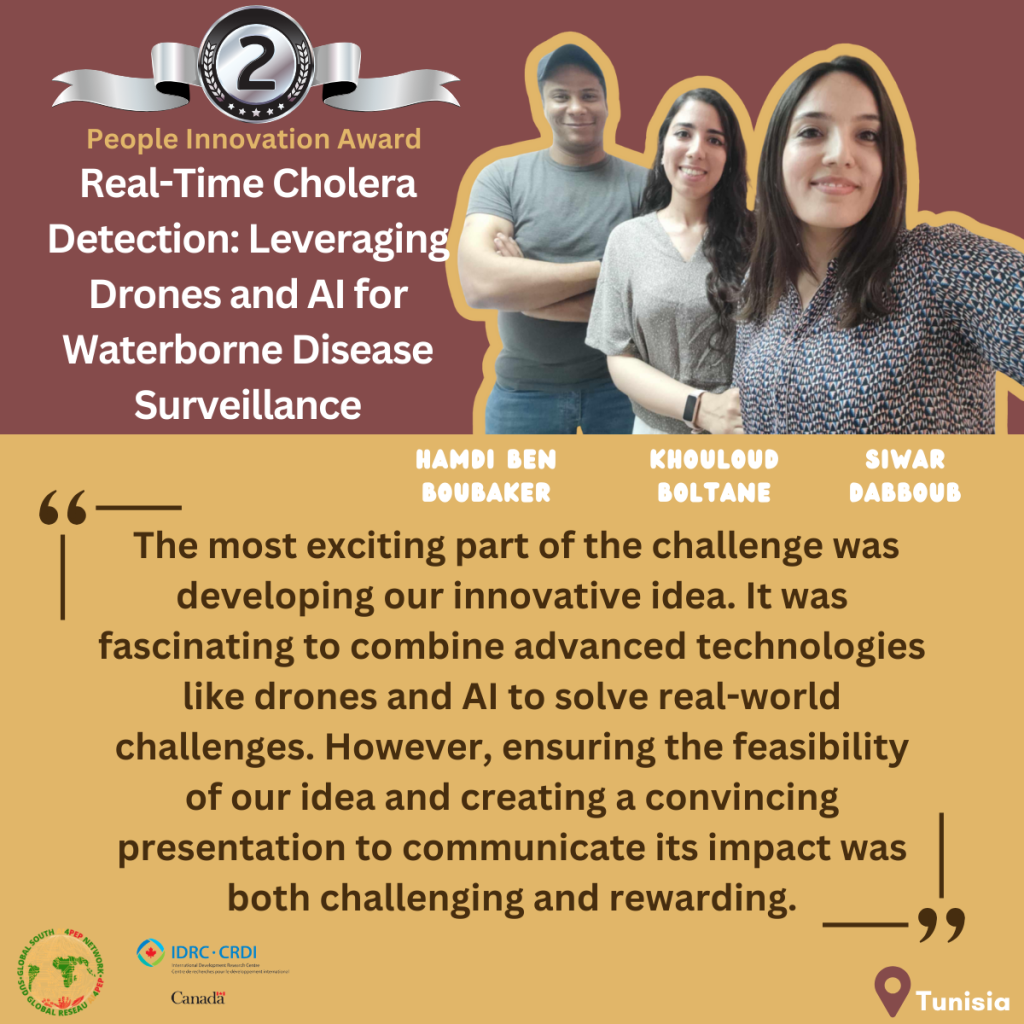When AI Takes Flight: Tackling Cholera with Drone Technology

In a year when waterborne diseases continued to claim lives and disrupt communities, a trio of students from Tunisia and Madagascar stepped forward with a bold vision. At the AI for Global Health Innovation (AI4GHI) Challenge, held on November 16, 2024, their interdisciplinary project titled “Real-Time Cholera Detection: Leveraging Drones and AI for Waterborne Disease Surveillance” earned them second place in the People’s Innovation Award.
Led by Khouloud Boltane (Chemistry, University of Tunis El Manar), the team consisted of Siwar Dabboub (Environmental Studies, University of Tunis El Manar), and Hamdi Ben Boubaker (Environmental Studies, The Catholic University of Madagascar). The team fused their expertise to address a pressing global challenge. Their solution combined cutting-edge AI technology with drone systems to detect cholera in water supplies before outbreaks could occur.
The Project: A New Era in Disease Detection
Cholera, a bacterial disease closely linked to poor water quality and sanitation, continues to plague communities worldwide, with the African region reporting over 60,000 cases in 2024 alone. Climate change has further exacerbated these outbreaks, making real-time surveillance critical.
The team’s system integrates a drone equipped with water sampling tools, environmental sensors, and a high-resolution optical microscope. Using Arduino technology, the system collects environmental data—pH, salinity, and temperature—and microscopic images of water samples. These images are analyzed by an AI algorithm (YOLO), known for its speed and precision, to detect Vibrio cholerae, the bacterium responsible for cholera.
“By combining Arduino, YOLO, and AI, our project serves as an early warning system for waterborne diseases,” the team explained. “The data allows public health officials to predict and mitigate risks before outbreaks occur, especially in hard-to-reach aquatic regions.”
Lessons from the Summit
Beyond learning to innovate, the team expressed that the AI4GHI Challenge was a valuable opportunity to hone collaboration and communication skills. “Developing our idea was exciting, but ensuring its feasibility and crafting a convincing presentation was challenging,” the team reflected. “We learned how to articulate our vision, tackle complex technical hurdles, and collaborate effectively under pressure.”
For Boltane, Dabboub, and Ben Boubaker, the experience highlighted the importance of interdisciplinary teamwork. The fusion of chemistry, environmental science, and technology proved critical to refining their solution.
The event also provided a chance to connect with other innovators tackling global health challenges. “The supportive environment and opportunity to exchange ideas were invaluable,” they shared. The team hopes future summits will include more networking sessions, workshops, and feedback from judges to further support participants.
A Vision for the Future
The students expressed gratitude for the platform provided by the AI4GHI Challenge, calling it an inspiring event that left a lasting impact. “This competition has empowered us to continue working on our project to make a meaningful difference in waterborne disease surveillance.”
Their innovative approach to cholera detection demonstrates the power of technology to address critical public health challenges. As Boltane and her teammates move forward, their project is a testament to the transformative potential of interdisciplinary collaboration and cutting-edge tools in the fight against climate-related diseases.
🎥 Watch their research video: https://www.youtube.com/watch?v=K0csP3qUVMY
📄 Read their abstract: https://drive.google.com/file/d/1ChB-eDt7jaMsE0yggS3EjjfsJZk0-4RV/view
Learn more about the amazing work from all our finalists: https://ai4pep.org/ai4ghi-finalists/
📖 Read the full article: https://ai4pep.org/ai4ghi-2024-peoples-innovation-award-2nd-place-winners/